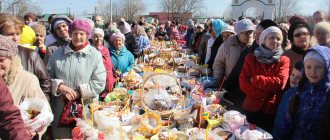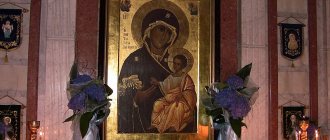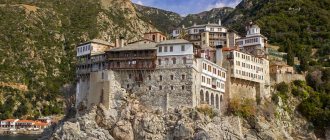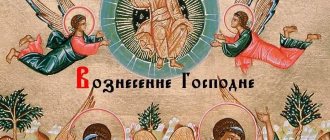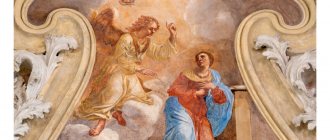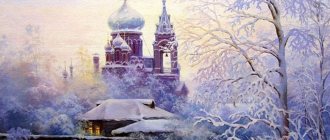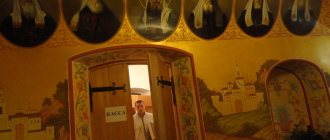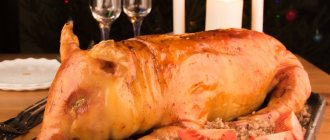January 7 is the day of the great, all-solemn holiday, “the mother of all holidays,” according to St. John Chrysostom. The Nativity of Christ is the oldest Christian holiday, established already during the time of the disciples of Jesus Christ - the apostles. The day of Christmas, December 25 (January 7 - according to the new style), was pointed out in the 2nd century by St. Clement of Alexandria. Meanwhile, the fact that people have been celebrating Christmas on the same day for centuries does not mean that Christ was born exactly then.
The fact is that the main source of Christian history - the Bible - bypasses the exact date of the birth of Jesus. There are stories about the events preceding his birth. About the next ones after birth - too. But there is no date itself. Read more about this and other unexpected facts about Christ here.
“Due to the absence of a common calendar in the ancient world, the exact date of Christmas was not known,” notes Father Alexander Men in the book “Son of Man.” —Indirect evidence leads historians to the conclusion that Jesus was born ca. 7-6 BC."
history of the holiday
The Nativity of Christ in Orthodoxy is the second most important holiday after Easter. January 7 is the approximate date of the birth of Christ; no one knows the exact day. The first celebrations are mentioned in the 1st century. Until the 4th century, Christmas was celebrated on the same day as Epiphany - January 6th. This significant day was called Epiphany.
The first time a separate holiday of Christmas began to be celebrated was at the beginning of the 4th century in the Roman Church. In the east, the separation of Epiphany and Christmas occurred half a century later. For a long time, Orthodox believers could not set an exact date for the celebration. The first Christians did not celebrate Christmas at all. The fact is that these, as a rule, were Jews, and they identified the birth of a baby with pain and agony. The holiday of Christmas appeared when the Greeks joined Christianity.
In Rus', mass celebrations began at the end of the 10th century, after the baptism of Prince Vladimir. At the beginning of the 13th century, a nativity theater came from Poland for the festive festivities on January 7, accurately reproducing the story of the birth of the baby Jesus and his persecution by King Herod. This tradition lasted for six centuries, until the October Revolution. At the end of the 19th century, the Christmas tree became an integral attribute of the holiday, which was placed not only in city houses, but also in village ones. At the beginning of the 20th century, Father Frost appeared in the manner of the West.
In the 20s of the 20th century, anti-religious propaganda began in the country, and Christmas celebrations stopped. But, despite this, until 1929, January 7 was marked in calendars as a holiday and was a day off. In 1929, the Nativity of Christ became banned. The Christmas tree was called a “priestly custom.” Russian people, for whom having a fir tree in the house in January became a tradition, began to decorate their homes with it for the New Year.
The revival of the holiday of the Nativity of Christ occurred in 1991. On New Year's Eve 1990, the government declared January 7 a non-working day.
The story of the birth of Jesus Christ
At a time when Mary was carrying a child in her womb and only a few days remained before the baby was born, an announcement was made about the population census. All people had to be in their place of permanent residence. Mary and her husband Joseph were forced to go to Bethlehem. On the fifth day, in the evening, they reached the city and began to look for accommodation for the night. There was no suitable place and they had to spend the night in a cave, where shepherds drove their cattle in bad weather. It was on this night that the Savior was born. Mary swaddled the newborn Christ and placed him in a manger filled with hay. At the moment of the birth of Christ, a new star, called Bethlehem, shone in the sky above the cave.
The shepherds who were located near the cave were the first to know about the birth of God's son. The darkness of the night was suddenly illuminated by a bright light and an angel appeared from heaven, announcing the completion of the long-awaited event. Then the divine army descended along the shining road and greeted the little Christ with a joyful, solemn song. When the darkness of the night again enveloped the earth, the shepherds saw a light coming from one cave. Entering there, they saw Joseph, Mary and the baby in a manger.
King Herod the Great of Judea learned of the birth of the Son of God and decided that he could take his place on the throne. At first he tried to find out the whereabouts of the baby from the wise men, but they did not tell him, as they assumed an evil plan. Then Herod took cruel barbaric measures. He ordered the killing of all infants under two years of age. 14,000 children died during the horrific disaster. Jesus was saved by an angel who appeared to Mary and advised him to seek refuge in Egypt. The family lived in this country until the king of Judah died.
Prayer
On the night before the onset of the sacred date, Orthodox people from all over the world read the following words:
Your Nativity, Christ our God, illuminated our sinful world with its bright light; similar to what happened then: the heavenly bodies, like the Most High God, those who served were taught to worship You according to the Star that appeared in the sky, the Sun of Truth, in order to become closer to You, the East from above. Glory to you, our Almighty Father!
Akathist
People who attend church on the eve of Christmas read an akathist, presented with laudatory speeches dedicated to the Son of God, his mother the Holy Mother of God, and the Lord Almighty.
Troparion, kontakion and magnification
Troparion:
Your Nativity, our Christ, illuminated our sinful earthly world with a bright divine light; we are taught by it to worship You, our Sun of Truth, and to exalt Your name everywhere. Glory to Thee, our Savior!
Kontakion:
Today the Virgin will become the mother of the one who is above all else in the world, the cave will become his first home, the Angels will announce the glorious news to the whole world, the wise men follow the sacred star: for a Child has been born, who will be the eternal God.
Greatness
Our Christ, we magnify You, for the salvation of our souls you paid with your flesh, born son of the Most Pure Virgin Mary.
How Christmas is celebrated in Russia
According to the Orthodox laws of the Russian Church, Christmas is preceded by the Nativity Fast. There is a special Saturday on the eve of Christmas, ending with Christmas Eve. At night, all-night vigils are held in the church, at the beginning of the holiday, solemn services are held and the memory of Christ and the Mother of God is honored. When a great holiday arrives, Christians, according to custom, exchange the words: “Christ is born!” In response you need to say “We praise him!”
After visiting the church in Rus', festivities began. The people had a fun time: they held carols, dressed up, sang and danced. Nativity scenes were built and the scene of the birth of Christ was played out. The children were supposed to take the supper to their godparents. In return, they treated the children and gave them gifts.
According to the old Russian custom, a goose is baked for Christmas, and the whole family gathers at the table. On Christmastide, evening fortune telling is held.
All-night vigil
The All-Night Vigil is a liturgical service that consists of Vespers and Matins, which received these names based on the time they took place. Before the holidays, morning and evening services are combined into the so-called “all-night vigil,” that is, prayer that continues all night. This prayer happens only twice a year - at Christmas and Easter. Before Christmas, at the All-Night Vigil, they serve not Vespers, but Great Compline (it is performed after Vespers served on Christmas Eve, hence the name).
Christmas carols
After the celebration of Christmas comes the holy week, ending on the eve of Epiphany. During Christmas time in Rus', sledding, social and family celebrations, fun and theatrical performances were organized. Among the people, Christmas stories passed from mouth to mouth, telling about good miracles occurring these days. In Rus', it was popular among young people to organize Christmas fortune-telling. Unmarried girls tried to find out in this way when they would get married and who would become their betrothed. The Orthodox Church has always opposed this custom and considered it not only blasphemous, but also dangerous.
During the holy week, it was customary for the people to sing carols. Young boys and girls, as well as children, dressed up in different costumes that hid their identity and went around the houses. When the owners opened the door, the mummers had to sing a song called a carol. For this they were treated to sweets. Carolers were always welcome and greeted warmly. To refuse the mummers welcome and refreshments means inviting trouble into the house.
Different calendars, “old” and “new” style: what is the difference?
Literature:
- The Gospel of Matthew and the Gospel of Luke, chapters 1-2, tell about Christmas.
- Four Gospels. Interpretation and guide to study (compiled by M. Barsov). T1, “Lepta”, M.: 2002, p. 99-287.
- Kuraev Andrey, deacon. School theology. "Svetloyar". – St. Petersburg, 2000.
- Nativity. / Ed. prof. M. Skaballanovich. Holy Trinity Lavra of Sergius, 1995 (reprint of the 1916 edition).
- Uspensky N.D., prof. History and significance of the Christmas holiday // Journal of the Moscow Patriarchate. 1956, no. 12.
- Jesus Christ and the Gospels. Dictionary. // Biblical and Theological Institute of St. Apostle Andrew. M.: 2003, p. 531-544.
Signs for Christmas
In Rus', the Christmas holiday had its own signs, which the people sacredly believed and, in connection with this, adhered to certain rules.
- If a woman comes to visit first at Christmas, this is not good: the women in the family will be sick all year.
- If on Christmas Day the hut is cleaned, there is a clean tablecloth on the table, and the owners are dressed in new clothes, expect a good harvest.
- It was not expected to drink clean water during the morning meal; it was believed that a person who drank water on Christmas morning would suffer from thirst for the whole summer.
- To prevent livestock from running away from the herd, table legs had to be tied together with ropes at Christmas.
- The food left uneaten at the evening table was taken outside the outskirts and given to the “wolves.” In this way, the peasants tried to feed wild animals so that they would not steal livestock.
- A warm day at Christmas heralds spring. If you believe another sign, then this means thick bread.
- Many stars in the sky foreshadow a bountiful harvest of berries.
What is the purpose of the Incarnation of the Son of God?
The purpose of the incarnation of the Son of God was connected with the implementation of the eternal Divine plan for the Salvation of mankind, aimed, in particular, at its spiritual and physical revival. The spiritual renewal of a Christian takes place throughout his entire life. The radical renewal of believers will take place on the day of the general resurrection of the dead, when “the righteous will shine like the sun in the kingdom of their Father” (Matthew 13:43).
Modern celebration traditions
The celebration of Christmas in Russia was allowed relatively recently, therefore, unlike Western countries, in our country there are no established customs and traditions for this holiday. The main religious events take place in Orthodox cathedrals and churches, and the Russian people idly relax during the New Year holidays. Since 1929, the main festivities have been moved to the New Year, so Christmas is quiet and peaceful. But still, adherents of old traditions are trying to resume the old games and festivities at Christmas. In some cities of our country, local authorities organize a holiday for the townspeople in the central square.
The Russian Church solemnly celebrates the Nativity of Christ. On Christmas Eve, Orthodox churches are filled with many Christians, many of whom spend the whole night there. Public television broadcasts live all-night vigils and morning liturgy on central channels.
Christmas decorations at home
There are many ways to spice up your apartment or home for Christmas. This applies to decorating the Christmas tree, fireplace, arranging gifts, and making crafts.
Here are the options for Christmas decor in your home:
Christmas tree made from Christmas cards
Just choose the best cards and hang them on the wall in the shape of a Christmas tree to get a festive look. Or put up a “live” Christmas tree.
Craft – citrus garland
New Year and Christmas are associated with the smell of tangerines and oranges. Why not make a simple DIY garland from these fruits?
You just need to stock up on wire or strong thread and glue pieces of dried citrus. You can hang such a garland on a Christmas tree or on a wall.
Christmas sock
In Russia this is not so common, but some people prefer to decorate the festive area in the house with Christmas socks: traditionally, gifts should be hidden there. But you can simply hang them beautifully next to the fireplace or Christmas tree.
Fireplace
Decorating the fireplace in your home for Christmas is a major tradition in the West. Even if there is no fireplace in the house, why not make a decorative one with your own hands?
Decorative pillows
Watching your favorite holiday movies will be much more enjoyable with a cozy throw pillow. You need to lay out a couple of red pillows, tie them with a white ribbon and add a sprig of greenery to liven up the chair or sofa.
What not to do at Christmas
- On Christmas Day, Christians try not to work.
- Handicrafts are especially prohibited: sewing, knitting, weaving, embroidery. Handwork on this day attracts troubles and misfortunes to the house.
- On this day you should not wear old or black clothes.
- On the eve of Christmas it is forbidden to guess.
- You can't clean up until the old New Year. On January 14, you need to sweep away all the garbage and burn it in the yard.
- On the eve of the holiday you cannot go to the bathhouse or wash yourself.
- During the holy week, hunting is prohibited. It is believed that the souls of the dead these days inhabit animals.
Why did the pagan Magi come to worship Jesus Christ?
As follows from the Gospel, the motivation for the Magi (wise men, magicians) to go to Jerusalem was the appearance of an unusual star in the sky. There are different opinions about what this star was. According to one point of view, quite widespread, the appearance of an unusual star should be understood as a visual convergence at one point in the sky, in the constellation Pisces, of two planets: Jupiter, Saturn, which after some time were “joined” by Mars. This event occurred in 747 - 748. from the founding of Rome (748 - 5 years before the beginning of the new era). According to the astrological beliefs to which the Magi may have been subject, Jupiter indicated a glorious king, Saturn heralded a coup, and Mars heralded the conqueror. It is not known for certain from which country the Magi came. It is believed that they came from Arabia or Persia. It is likely, as a number of researchers think, that they could be familiar with the biblical prophecies about the appearance of the Reconciler, the Savior, including the prophecy about the rising of a star: “I see Him, but now not yet; I see Him, but not close. A star rises out of Jacob, and a rod rises out of Israel” (Num. 24:17). These prophecies could have become the property of eastern (Babylonian, Persian...) sages during the period of captivity of the Jewish people (Babylonian captivity).
